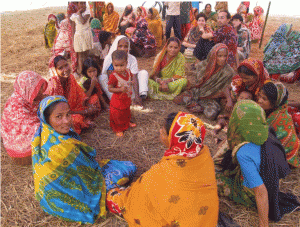
Eating Diversity: South East Asia food sovereignity and climate changes
Invitation to be part of the 4th September meeting
at 7 PM Rome Time
location: EIUC Venice Italy
Monastero san Nicolò
” Eating diversity South Asia”
meeting on the topic:
Climate change effects on local and indigenous communities in the South Asia.
Environmental refugees and the Caravan for climate justice initiative
The focus will be the on the causes of migrations understanding the issues of environmental refugees and the interdependencies between global south and global north, comparing agricultural traditions and innovations that jeopardise the local identity, getting to know the issues of food sovereignty that mobilised the Caravan for Climate Justice in South Asia, the effects of climate changes on indigenous people, local economy, livelihood and ecosystems causing internal and external waves of migrations and displacement.
This is a video produced by Meghna Alam and other members of
Krishok federation part of LCV South Asia, we were connected with during the CIBARSI DI DIVERSITA meeting.
you can find more info here: friendsofbkf.wordpress.com/about/
Speakers:
Surapon Duangkhae, มูลนิธิสืบนาคะเสถียร SeubNakhasathienFD (THAI), on actions for forest and biodiversity conservation and the turistic pressure on the locals livelihood.
Yudhvir Singh, Indian Coordination of Commitee of Farmers Movements
Megna Alam, youth Coordinator of the South Asian Climate Justice Caravan and President of Bangladesh Krishok Federation
Discussant
Joy Betti Green Farm Movement, New forms of contemporary slavery
Bangla School of Venice
Thailandese association of Triveneto
ass. Gamaka (Indian performative arts)
Coordinator of the table
Alessandra Manzini, In Diversity Onlus
SUBJECTS and SPEAKERS
The Seub Nakhasathien Foundation was established on 18 Setember 1990, following the tragic deth of and in tribute to a well respected wildlife biologist of the Royal Forest Department, Mr.Seub Nakhasathien, who was the chief of the Huay Kha Khaeng Wildlife Sanctuary, Thailand’s finest conservation area.
The foundation was created with a clear objective to carry out it’s namesake’s unwavering work on nature conservation and wildlife preservation, so that people, wildlife and forest can coexist in harmony, academics, students, journalists, businessmen officials, political reformers and general public who share the same passion for conservation. http://www.seub.or.th/
South Asian climate Justice Caravan
climate_justice_caravan_info_final.pdf
The Bangladesh Krishok Federation (BKF), a group devoted to landless peasants since 1976, and the Bangladesh Kishani Sabha (BKS), a female counterpart to the Krishok Federation since 1990, have been working together for the rights of the landless in Bangladesh through occupations, demonstrations, and legal aid service. In Bangladesh 70% of the population of 160 million are considered “landless”. BKF has been working for nearly 35 years on securing right for peasants.
http://www.krishok.org/about.html
http://lvcsouthasia.blogspot.it/search/label/bangladesh
La Via Campesina is the international movement which brings together millions of peasants, small and medium-size farmers, landless people, women farmers, indigenous people, migrants and agricultural workers from around the world. It defends small-scale sustainable agriculture as a way to promote social justice and dignity. It strongly opposes corporate driven agriculture and transnational companies that are destroying people and nature.
Via Campesina is a grassroots mass movement whose vitality and legitimacy comes from farmers’ organizations at local and national level. The movement is based on the decentralization of power between 9 regions. The coordination among the regions is taken up by the International Coordinating Committee which is composed of one woman and one man for every region, elected by the member organizations in the respective regions.
La Via Campesina comprises about 150 local and national organizations in 70 countries from Africa, Asia, Europe and the Americas. Altogether, it represents about 200 million farmers. It is an autonomous, pluralist and multicultural movement, independent from any political, economic or other type of affiliation.
Unity among peasants, landless, women farmers and rural youth
http://lvcsouthasia.blogspot.it/
Green Farm Movement is an independent lay organization which works for world solidarity and was born to spread dynamic culture, culture of non-violence, commitment against conflicts and commitment for the development of the individual, through the main principle of “Co-thinking”.
http://www.greenfarmmovement.org/?lang=en
LOCAL PARTNERS:
In Diversity ONLUS operates to sustain and valorise diversity, social justice through cultural activities and innovative services to solve difficult situations of social and psycho physical diseases such as loneliness disabilities and poverty with experimental methods such as paths of art therapy, theatre of the oppressed, intercultural theatre and the promotion of communitarian ecologically sustainable life styles. From 2016 organiser of the Fort in Fest: festival of cultural diversity inclusion through arts for social change
Bangla School of Venice: is a voluntary no governmental local association that helps to improve the quality of life of the Bangla community of Venice, promoting music, culture and education of Bangladesh in Venice,Italy
Thailandese association of Triveneto: is a cultural association born to increase and improve the knowledge of the Thai culture in Veneto.
http://www.culturale-thai.sigratis.it/Kapi-for-Mrigadayavan-p59.html
Ass. Gamaka: is a cultural association for the theatrical coreutical and musical research. The association operates in the sectors of artistic production, research and promotions of classic Indian performative arts. The association is an important training institution of Indian performative arts, committed to diffusion of the Indian cultural heritage. http://associazionegamaka.blogspot.it/
FORT in FEST is a festival and a platform for the expression of cultural diversity and the intercultural dialogue, in a open process of community building. It take places in former military sites surrounding Venice, symbolic places that could help to deconstruct the concept of the enemy and the stranger giving an opportunity to meet and discover the diversity of cultures present in the metropolis of Venice, the causes of migrations, the driving forces of climatic changes and the impacts on local communities and indigenous people, the interdependences of the global-local life styles and system of agriculture and the global struggle for food sovereignty of the grassroots peasant movements la via campesina.